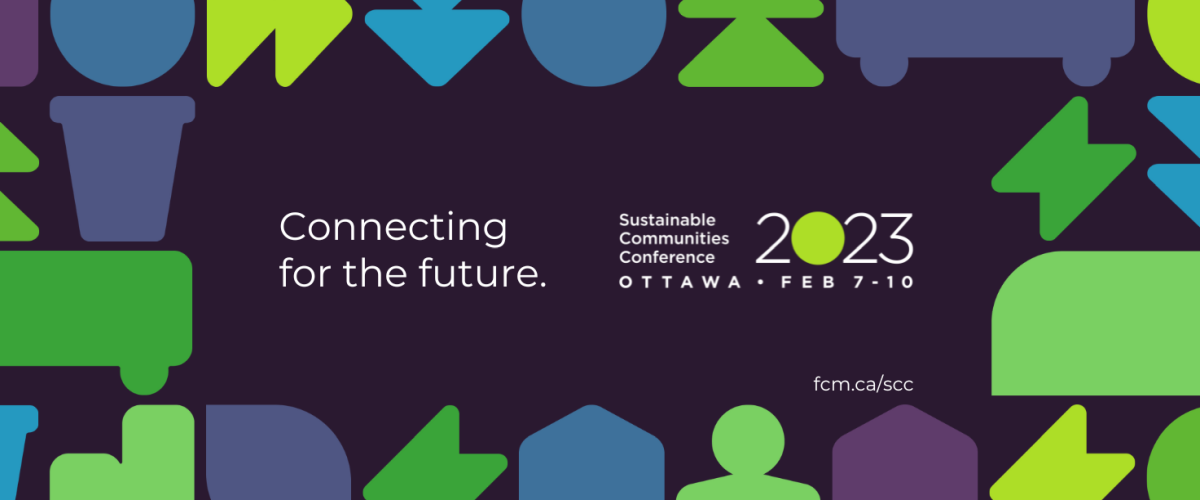2023 Sustainable Communities Conference
For the first time, FCM hosted its Sustainable Communities Conference as a fully hybrid event. With a phenomenal in-person attendance and the option of virtual attendance, the event was re-energizing and reinvigorating for sustainability champions and changemakers from all over the country after many years of working on projects in isolation due to the pandemic. This year, the hybrid event brought together close to 600 registered delegates from across Canada, with almost 90 percent attending in person. Participants heard from inspiring speakers, attended expert panel discussions and interactive workshops, and took advantage of several networking opportunities and local site visits in the region. This high-energy event amplified key calls to action around Canada’s net-zero goals, climate-ready communities and the important connections between human rights, Indigenous rights and the right to housing.
Keynote and plenary sessions
The conference featured notable speakers and panellists, such as mayors, city councillors and CEOs of non-profit organizations, who highlighted the critical work communities are undertaking in developing innovative and equitable sustainability solutions. These included:
- An inspiring keynote address by energy transition expert Søren Hermansen, the driving force behind the transformation of Samsø, sharing the story of how the Danish island transitioned to 100 percent renewable energy
- A compelling discussion by Margaret Pfoh, Chief Executive Officer, Aboriginal Housing and Management Association, about Indigenous justice and the role all people need to play in meaningful engagement and participation that re-centres Indigenous wisdom to help transform systems (a process she likes to call reconciliACTION)
- A thought-provoking panel session during which Indigenous and municipal leaders discussed perspectives, actions and opportunities for Reconciliation and how to embed them in community sustainability
- A panel where several notable participants, including Edmonton’s Mayor Amarjeet Sohi, explored how municipalities are responding to compounded threats—such as climate change, the pandemic and infrastructure deficits—while making the case that serious action is needed
Adding to our traditional keynote, panels and workshops, this year’s conference program featured several new elements. These included a breakfast session where delegates had the opportunity to sit down with more than 50 Members of Parliament from all parties, an industry showcase of private sector sustainability vendors and suppliers who have been vetted to meet GMF’s high performance standards, and a project showcase highlighting 22 municipal projects. Several popular elements were back this year, including in-depth training sessions and study tours of sustainability projects in the National Capital Region, enhanced networking and social events, which together made SCC 2023 an event to remember.
KEY RESULTS:
- Most participants since 2011 with 534 registered delegates (473 in person, 61 virtual)
- 83% of respondents were satisfied or very satisfied
- 86% of respondents said the conference was relevant and inclusive
- 71% first-time attendees, 29% returning attendees
- 21,600 unique visits to the conference website
- 35 digital ads over 14 weeks generated 1.2 million impressions
Sustainable Communities Awards
Our Sustainable Communities Awards (SCAs) honour the most innovative and responsible local environmental sustainability initiatives. This year’s winning projects ranged from turtle-saving roadwork measures to organic waste diversion as a way of tackling climate change and food scarcity. Awards were given in five categories:
- Natural asset management
- Climate change mitigation
- Waste
- Affordable housing retrofit
- Community building retrofit
This year, the awards were presented in person during the Sustainable Communities Conference. The winners also shared project insights at three “SCA Talk” sessions open to all delegates attending the conference. Case studies on each of the winning initiatives, along with video recordings of the SCA Talk sessions, were also released after the winners were announced.



